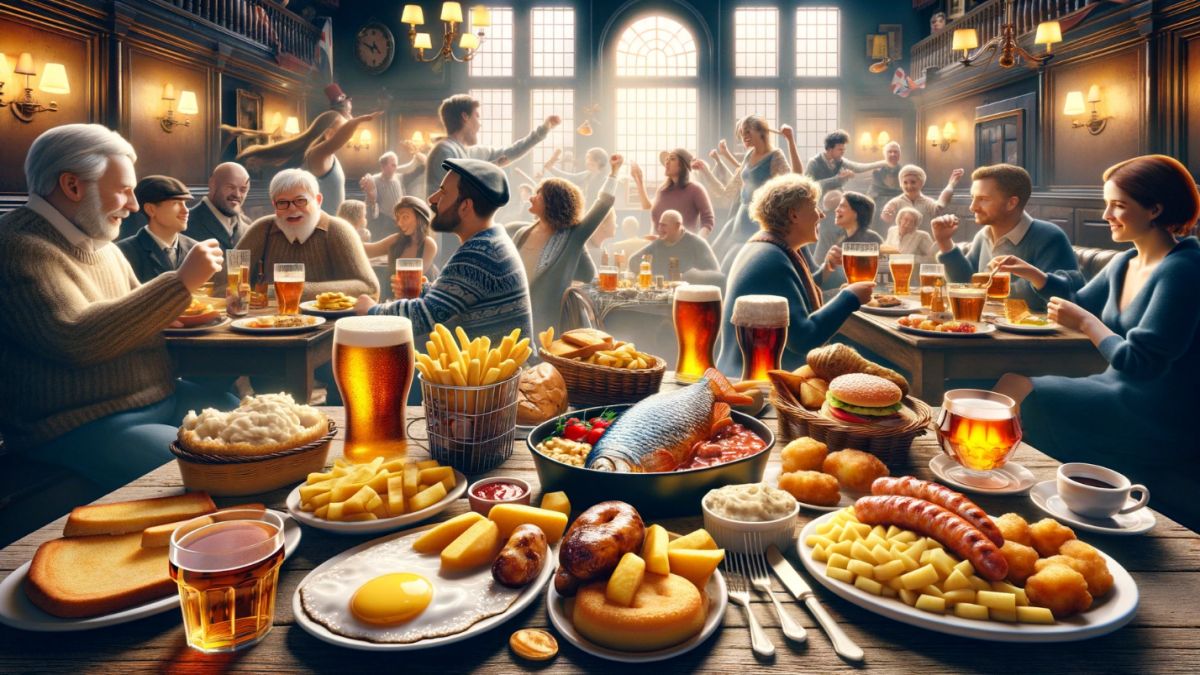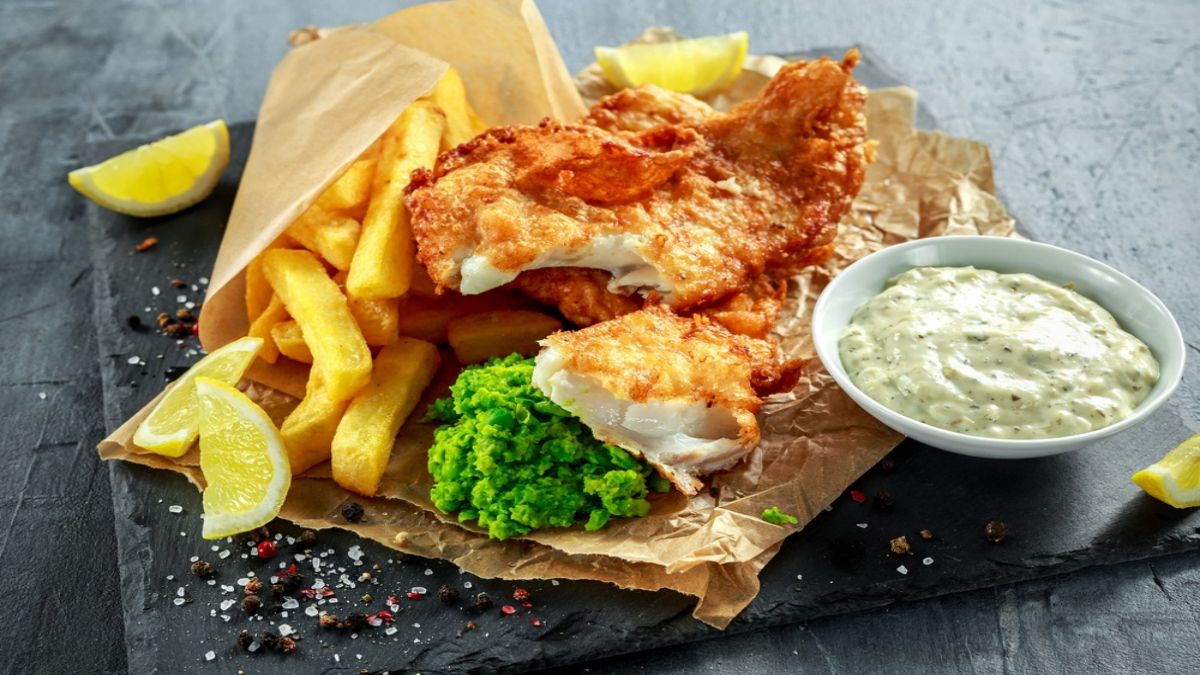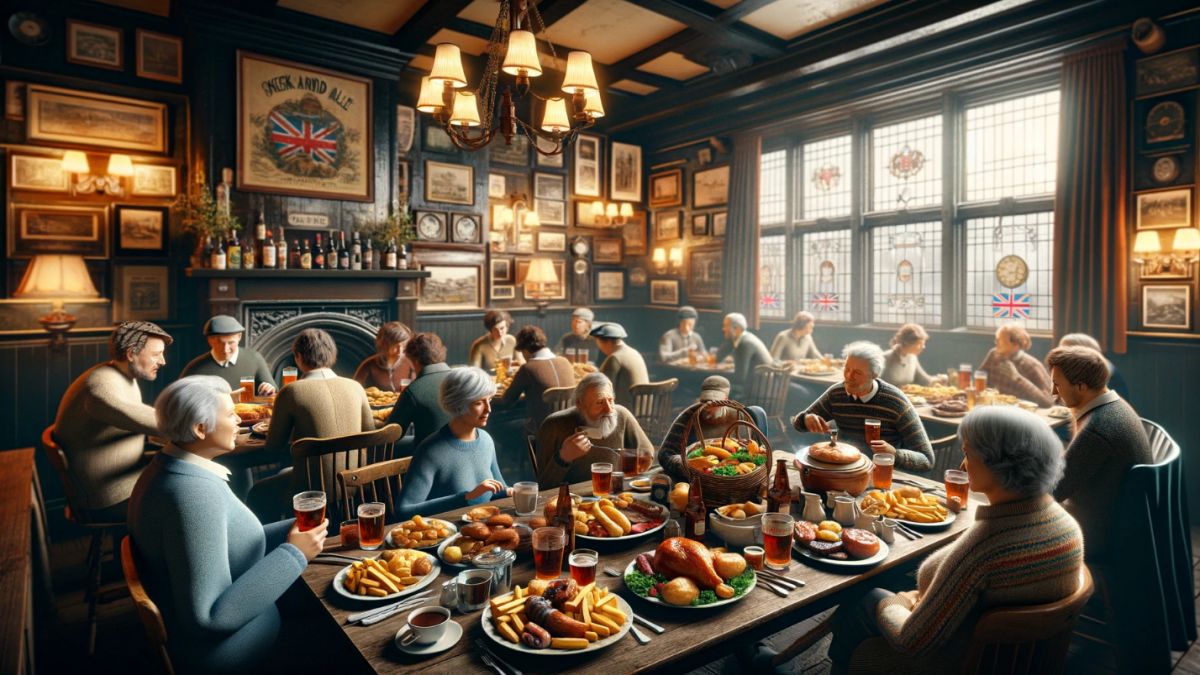Advertisement
Britain has a rich history, and many countries and events have influenced its food. New foods and cooking methods brought to Britain by the Romans led to lavish Middle Ages feasts. Food in Britain has evolved greatly.
The Industrial Revolution, which brought mass-produced goods and city life, changed Britain's food.
After all these changes, some traditional foods have remained and represent Britain's rich culinary history. The British Isles' climates and geography provide fishing spots and fertile farms.
These tools shape the nation's food culture and regional differences. British food is reviving, drawing on its history and global influences.
Iconic dishes
Fish and chips: the national dish
Fish and chips, the national comfort food, are a British classic. Batter-fried fish is often served with heavy potatoes. The fish is usually cod or haddock. Jewish immigrants from Portugal and Spain brought fried fish to Britain in the 1800s.
This may be where fish and chips originated. First "chippies," or fish and chips restaurants, opened in Britain in the 1860s. The middle class embraced them quickly.
Fish and chips are simple to make despite their tradition. Salt and vinegar make it go well with mushy peas and tartar sauce. Using flexible potatoes and abundant local fish, the dish shows British cuisine's creativity.
Fish and chips are popular nationwide, whether at a fancy restaurant or a beach shack.
Sunday roast: traditional Sunday meal
The British Sunday roast symbolizes family and society. Beef, lamb, pig, or chicken are cooked and served with potatoes, vegetables, Yorkshire pudding, and gravy in this traditional English dish.
They celebrated with a meat-filled meal on Sundays because they didn't eat meat during the week. This 1500s custom gave rise to the Sunday roast. Every Sunday roast bite matters.
Yorkshire pudding is a classic roast beef side. Batter-based meat dish. Cook the meat, carrots, Brussels sprouts, and turnips until golden brown.
The meat's juices make a delicious sauce for the meal. British culture values long, leisurely meals with family and friends.

Afternoon tea: A British institution
Afternoon tea represents everything British with its polished luxury.
Anna, Duchess of Bedford started this habit in the early 1800s because she was hungry between her small lunch and late dinner. afternoon tea, sandwiches, and cakes were always available for snacking with friends.
Traditional afternoon tea includes sweet milk tea, finger sandwiches, scones with jam and clotted cream, and cakes and treats.
Savoury foods go on the bottom of a three-tiered stand, cakes in the middle, and sweets on top. This tradition, common in tearooms and five-star hotels, symbolizes the British's kindness.
Interesting facts
The UK consumes 165 million cups of tea daily
It plays a big role in British society, as shown by the fact that tea is very famous. One of the biggest tea eaters in the world is the United Kingdom, which has 165 million cups of tea every day.
The British East India Company brought the drink to Britain in the 1600s, and it has become an important part of British culture ever since. Tea is a common drink in British homes. People drink it to relax at night, wake up in the morning, or do something special in the afternoon.
Advertisement
Fish and chips shops have been around since the 1860s
Since the 1860s, fish and chips shops, also known as "chippies," have been a part of British food. In 1860, Joseph Malin started the first fish and chips shop in London. The idea quickly spread across the country.
This type of business became very popular among the middle class in the late 1800s and early 1900s because it served cheap, filling food. In the UK, more than 10,500 restaurants serve fish and chips, which has been a regular food for many years.
Modern British cuisine: Fusion foods and contemporary Trends
British food reflects globalization by mixing old and new ideas. Britain's restaurants combine international cuisine well because immigrants bring new tastes and cooking skills.
Falafel, jerk chicken, sweet and sour pork, and others combine Indian, Chinese, Caribbean, and Middle Eastern flavors.
These influences have inspired British chefs to create international-inspired dishes with British ingredients. Due to this trend, gastropubs serve gourmet pub food.
Truffle mac & cheese, beer-battered halloumi, and stewed lamb pie are updated in this style. The UK "farm-to-table" trend benefits from local produce. This supports local farmers and ensures fresh, high-quality food.
Organic farming, sustainable fishing, and ethical shopping are gaining popularity among British chefs and shoppers.

Quirky British food traditions
Yorkshire pudding
Yorkshire pudding with Sunday roasts is a nice British tradition. Delicious batter pudding is made from flour, eggs, and milk and baked in hot fat until puffy and brown.
Yorkshire pudding began as a pre-meal side dish to limit meat consumption. Due to its texture and flavor, people eat it with cooked meats and sauce.
Black pudding
As a typical British dish, it has a long and interesting past. It's a type of sausage that's made from blood. The British have eaten oatmeal, hog blood, and fat for a long time.
Even though it has some strange ingredients, black pudding is a popular choice because it tastes great and is good for you. For a full English breakfast, it is often fried and eaten with eggs, bacon, and other meal foods.
Eton Mess
Brits treat Crushed meringue, strawberries, and whipped cream make Eton Mess. Delicious and easy to make. The annual cricket match between Eton College and Harrow School may have inspired the recipe.
Often served at this event. The meal is called "messy" because the jumbled pieces look good. Eton Mess exemplifies lighter British food with its delicious mix of flavors and textures.

Conclusion
British food is a mix of old and new, reflecting its long history and many cultural influences. Many Britons enjoy brunch, fish and chips, and afternoon tea. Modern British cooking is also incorporating foreign styles.
This is why the food scene evolves. British cooking has evolved while retaining its roots. This demonstrates its strength and flexibility.
No matter what eating trends come and go or whether old dishes are revived, British food will always be loved and important.
British cuisine will cherish your taste buds through time and space, whether you eat in a fine dining restaurant or a cozy pub.
Advertisement





